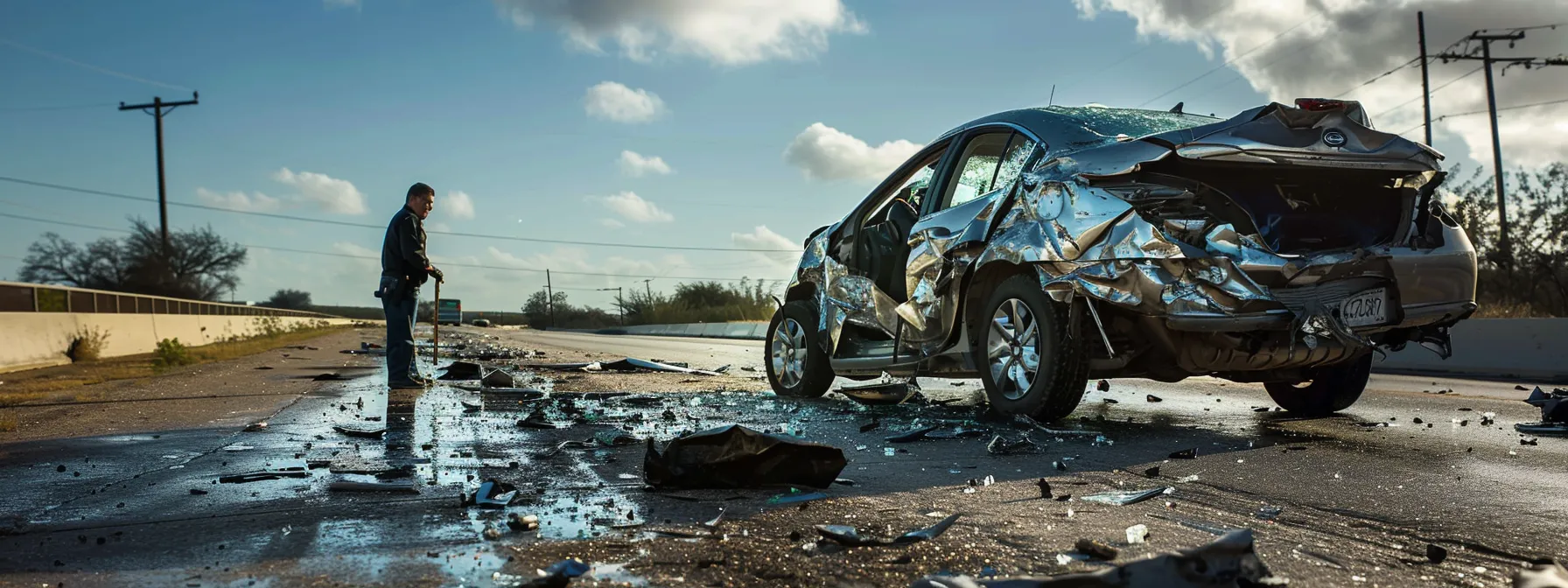Navigating the aftermath of a car accident in Texas can be a daunting experience, especially when it comes to understanding compensation laws. This guide will provide a comprehensive overview of the legal landscape, including the determination of fault, the types of compensation available, and the process of filing a claim. For those seeking personal injury services, the Heil Law Firm stands ready to assist. By engaging with this content, readers will learn how to effectively gather evidence and utilize personal injury protection to their advantage. If you’re grappling with the complexities of a car accident claim, visit Heil Law Firm and contact us to secure the guidance you need to navigate these challenges.
Key Takeaways
- Texas law requires prompt action to preserve car accident compensation rights
- Comparative negligence in Texas can reduce compensation if the victim is partly at fault
- The statute of limitations for Texas car accident claims is two years from the accident date
- Uninsured motorist coverage is crucial for compensation in hit-and-run or underinsured driver cases
- Legal expertise is vital to navigate insurance tactics and secure fair car accident settlements
Overview of Car Accident Compensation Laws in Texas

In Texas, navigating car accident compensation involves understanding the state’s at-fault insurance system, which requires drivers to carry mandatory auto insurance to cover potential damages. This system is intertwined with comparative negligence principles that influence compensation based on each party’s liability, especially in multi-vehicle collisions. Victims may seek recompense for a range of outcomes, including disfigurement, therapy costs, and impacts on quality of life. A thorough grasp of these laws, alongside evidence from witnesses and documentation of neck and other injuries, is crucial for those seeking justice after an accident. contact us and Visit Heil Law Firm for personal injury services.
Texas’s at-Fault Insurance System
Under the at-fault insurance system in Texas, the driver who is legally responsible for causing a car accident is also responsible for compensating any victims. This compensation typically covers medical expenses, including costs for surgery, and other damages. The plaintiff, or injured party, must prove the other driver’s fault to claim a car accident settlement. This process often involves negotiations with the at-fault driver’s insurance company, which can be complex and contentious without proper legal guidance.
When a car accident occurs, Texas law requires the involved parties to file a claim with the responsible party’s insurance company. The statute of limitations sets a deadline for this action, making timely reporting and documentation critical. A successful insurance claim may result in a settlement that covers various expenses and losses. However, if the insurance company disputes the claim or offers an inadequate settlement, the plaintiff may need to pursue further legal action to obtain fair compensation.
Mandatory Auto Insurance Requirements
In the state of Texas, individuals involved in a car accident injury are required to navigate the mandatory auto insurance requirements, which serve as the foundation for any lawsuit that may follow. The law mandates that all drivers possess a minimum level of insurance coverage to ensure financial responsibility for damages or injuries caused in a car accident. This requirement is pivotal for victims seeking compensation, as it provides a primary source for recovery of damages, especially in cases of gross negligence.
When a minor car accident escalates to a court proceeding, the presence of auto insurance is often a critical factor in the resolution of the case. Texas law stipulates that drivers must carry insurance that covers potential liabilities, which is instrumental in safeguarding victims’ rights to fair compensation. This legal framework ensures that, even in the aftermath of an accident, the injured parties have a viable path to secure the financial support necessary for their recovery and rehabilitation.
Comparative Negligence Principles
In the realm of Texas car accidents, the principle of comparative negligence plays a pivotal role in determining compensation. This legal concept allows for the apportionment of fault among the parties involved, which directly affects the amount of damages a victim can recover. When seeking legal advice, it is imperative for individuals to understand that if they are found partially at fault for their pain and suffering, their compensation may be reduced proportionally. Expert negotiation skills and precise information gathering are essential to navigate this aspect of Texas law effectively.
For instance, in a scenario where a victim is deemed 20% responsible for an accident due to a minor lapse in judgment, the compensation awarded would be adjusted accordingly. This underscores the importance of obtaining comprehensive legal advice to ensure that the victim’s contribution to the accident is accurately assessed and argued. The intricacies of comparative negligence demand a thorough analysis of the incident, highlighting the necessity for victims to engage with seasoned legal professionals who specialize in Texas car accidents to advocate on their behalf.
Liability Considerations in Multi-Vehicle Collisions
In the complex scenarios of multi-vehicle collisions, determining negligence can become a multifaceted challenge. Each driver’s actions are scrutinized to establish their contribution to the motor vehicle accident. For instance, if a driver’s failure to signal before changing lanes results in a chain reaction where another vehicle swerves and causes a shoulder injury to a third party, both the initial and subsequent drivers may bear liability. Engaging an expert witness can provide critical insights into the causation and fault, which is essential for victims seeking fair compensation.
Moreover, Texas law requires a thorough examination of each party’s negligence in multi-vehicle accidents. This analysis is not only crucial for understanding the dynamics of the crash but also for the equitable distribution of financial responsibility. Legal professionals adept in car accident cases often employ reconstruction specialists to untangle the sequence of events, ensuring that their clients’ claims are substantiated by factual evidence. This level of diligence is paramount for those affected to navigate the legal landscape successfully and secure the compensation they rightfully deserve.
Determining Fault After a Car Accident

Determining fault after a car accident is a critical step in Texas car accident lawsuits, requiring meticulous collection of evidence at the scene. Police reports play a significant role, often capturing details of injuries, whiplash, or instances of driving under the influence. Witness testimonies can corroborate the sequence of events, while accident reconstruction experts may clarify complex scenarios, such as those involving spinal cord damage. Additionally, traffic violations are scrutinized for their impact on fault assessment, shaping the path to compensation for those affected.
Collecting Evidence at the Scene
At the heart of every accident claim in Texas is the critical task of collecting evidence at the scene. This evidence serves to establish fault, which is essential for the injured party’s compensation. Photographs of the vehicles’ positions, damage, and any relevant traffic light indicators can be invaluable, particularly when the accident involves rideshare services like Lyft. Victims should also document their immediate injuries and any anguish experienced, as these details can significantly influence the outcome of their claim.
Witness statements can provide an objective perspective on the events leading up to the accident, offering clarity on who may be at fault. It is imperative for those involved to gather contact information from bystanders who observed the incident, especially if it occurred at a busy intersection or involved multiple vehicles. The collection of this evidence is a strategic step in building a robust accident claim, ensuring that all factors, such as traffic light status and driver behavior, are meticulously recorded:
The Importance of Police Reports
Police reports are a cornerstone in the assessment of car accidents in Texas, providing an authoritative account that claims adjusters and lawyers rely upon to evaluate fault. These reports often contain critical information, such as indications of drunk driving or traffic violations, which can significantly influence the direction and outcome of a compensation claim. The involvement of a commercial vehicle, for instance, may be detailed within the report, highlighting the complexities and higher dollar stakes often associated with such accidents.
Moreover, a police report serves as a neutral record that can be pivotal when discrepancies arise between the involved parties’ accounts of the incident. It is not uncommon for a claims adjuster to defer to the police report when determining the liability and value of a claim. Therefore, securing a copy of this report is one of the first actions a lawyer will advise their client to take following an accident, ensuring that all facts are accurately represented and that the client’s rights to fair compensation are upheld.
Utilizing Witness Testimonies
In the aftermath of a Houston car accident, witness testimonies can be a decisive factor in a car accident claim. These accounts provide a judge or jury with a narrative that may confirm the presence of disability or amputation resulting from the accident, thereby influencing the determination of fault and the extent of damages awarded. Witnesses offer a unique perspective that can corroborate or challenge the evidence presented, making their testimonies a powerful tool in the pursuit of justice for the injured.
Securing accurate witness testimonies requires prompt action, as memories can fade over time. Legal professionals understand the importance of these firsthand accounts and often move quickly to document them. A detailed witness statement can paint a vivid picture of the incident, providing the clarity needed to navigate the complexities of a car accident claim and ensuring that those affected receive the compensation they deserve for their losses and suffering.
Role of Accident Reconstruction Experts
In the intricate process of establishing fault in Texas car accident cases, accident reconstruction experts are often the linchpin. These professionals meticulously analyze the crash site, vehicle damage, and any available telemetry data to piece together the events leading up to the incident. Their findings are instrumental in substantiating property damage claims and personal injury allegations, providing a scientific basis for legal arguments.
Their expertise is particularly valuable when property damage and personal injuries are significant, and the cause of the accident is not immediately apparent. By reconstructing the accident, these experts offer insights that can clarify liability, which is essential for victims seeking compensation for their losses. The following list represents the critical steps in the story of accident reconstruction:
- Collection of physical evidence from the accident scene.
- Analysis of vehicle damage and any skid marks on the road.
- Creation of a detailed reconstruction report to be used in property damage and personal injury claims.
Accident reconstruction experts provide a level of detail that goes beyond the initial reports, offering a deeper understanding of the dynamics at play. Their assessments often play a pivotal role in resolving disputes over who bears responsibility for a Texas car accident, thereby influencing the outcome of property damage and personal injury claims.
Impact of Traffic Violations on Fault Assessment
In the assessment of car accident injuries in Texas, traffic violations by any party involved can significantly sway the jury‘s determination of fault. For instance, if a driver’s disregard for traffic laws leads to another’s loss of consortium, this breach can be a compelling factor in the jury‘s deliberations. Insurance companies also scrutinize these violations when reviewing policy claims, as they can indicate negligence and influence the settlement offered.
Moreover, when a traffic violation is evident in the context of a car accident, it can serve as a clear indicator of fault, simplifying the legal process for the injured party. This clarity is particularly beneficial when establishing the extent of car accident injuries and the corresponding compensation. Legal professionals often emphasize the impact of such violations to ensure their clients’ claims are robustly supported, thereby facilitating a fair resolution within the insurance framework.
Types of Compensation Available to Accident Victims

Victims of car accidents in Texas have the right to seek various forms of compensation to address the financial and emotional toll of their ordeal. Recovering medical expenses is often the first concern, as treatments for injuries sustained in alcohol-related or other driving accidents can be extensive. Compensation for lost wages and earning capacity is also critical, considering the impact on a victim’s income. Pain and suffering damages acknowledge the non-economic impact of the trauma, while property damage claims seek to restore or replace damaged assets. In cases of egregious negligence, pursuing punitive damages may be appropriate. Each of these areas is vital for a comprehensive car accident claim, offering a financial lifeline to those affected.
Recovering Medical Expenses
In the wake of a car accident in Houston, victims often face the daunting task of securing payment for medical expenses. These costs can range from immediate emergency care to long-term needs such as physical therapy. Texas law allows for the recovery of such damages, ensuring that individuals are not left to bear the financial burden of injuries caused by another’s negligence. It is imperative for victims to meticulously document all medical treatments to substantiate their claims for compensation.
Moreover, when the conduct of the at-fault party is found to be particularly reckless, victims may also seek punitive damages in addition to compensation for medical expenses. This form of damages serves to penalize the wrongdoer and deter similar conduct in the future. Legal professionals in Texas are adept at navigating these claims, striving to ensure that their clients receive the full spectrum of compensation to which they are entitled, thereby providing a measure of justice for the hardships endured.
Compensation for Lost Wages and Earning Capacity
For individuals incapacitated by a car accident, the loss of wages and the potential decline in earning capacity represent significant financial concerns. Texas law acknowledges this hardship by allowing victims to claim compensation for income lost due to injuries, such as brain trauma, which may prevent them from fulfilling their occupational duties. This aspect of liability insurance coverage is crucial, as it provides monetary support during the recovery period and addresses long-term financial instability caused by the accident.
Moreover, when a traffic incident results in a cause of action, the injured party’s ability to earn a future income can be just as affected as their immediate financial situation. Legal professionals emphasize the importance of calculating these losses accurately, often requiring expert testimony to project the long-term effects on the victim’s livelihood. This compensation is essential for ensuring that victims are not financially disadvantaged by an accident for which they were not at fault, as affirmed by police reports and other evidence.
Pain and Suffering Damages
In the aftermath of an auto accident, victims often endure not only physical injuries but also emotional trauma, which is where pain and suffering damages come into play in Texas accident settlements. These damages are designed to compensate for the intangible losses that don’t have a direct monetary value, such as the distress caused by chronic pain from injuries or the anxiety associated with medication side effects. Pain and suffering damages are a critical component of an auto accident settlement, acknowledging the profound impact an accident can have on an individual’s well-being beyond the visible injuries.
It is important for victims to note that the statute of limitations in Texas imposes a deadline for filing a claim, which includes seeking compensation for pain and suffering. Legal professionals can provide invaluable assistance in quantifying these non-economic damages, ensuring that the emotional and psychological toll of an accident is factored into the settlement. By addressing these aspects, accident settlements in Texas aim to offer a more comprehensive form of restitution, helping victims to recover not just financially, but also in terms of their overall quality of life post-accident.
Property Damage Claims
In the aftermath of a vehicular incident, property damage claims emerge as a critical component of the compensation process for Texas residents. Whether the collision involves a personal car or a commercial truck, the evaluation of property damage is a meticulous process that assesses the extent of the injury to the vehicle. This evaluation is particularly important when the accident results in significant damage to high-value areas such as the hip or engine, which can greatly affect the vehicle‘s overall value and the owner’s mobility.
During a trial, the presentation of evidence related to property damage can significantly influence the jury‘s decision on compensation. It is essential for victims to document the condition of their vehicle immediately following the accident, as this serves as tangible proof of the injury sustained. Legal professionals often stress the importance of a thorough evaluation, which can lead to a more favorable outcome for the client, ensuring they receive adequate funds to repair or replace their damaged property.
Pursuing Punitive Damages
In cases where the defendant‘s behavior goes beyond mere negligence, Texas law permits the pursuit of punitive damages. This is particularly relevant in instances of distracted driving, where the defendant‘s lack of attention has led to severe consequences. The imposition of punitive damages serves a dual purpose: to penalize the wrongdoer for their reckless behavior and to signal to society that such disregard for safety and justice will not be tolerated.
Securing punitive damages requires a clear demonstration that the defendant acted with gross negligence or malice. The law in Texas sets a high bar for these awards, aiming to ensure that they are reserved for conduct that truly warrants this level of censure. For victims, the attainment of punitive damages can represent a significant victory, not only in terms of financial compensation but also in the sense of achieving a measure of justice for the harm suffered.
Filing a Car Accident Claim in Texas

When a car accident occurs, immediate steps are crucial, from documenting potential concussions to understanding comparative negligence. Victims must promptly report the incident to their insurance company, ensuring their testimony is on record. Negotiating with insurance adjusters often follows, requiring a firm grasp of one’s insurance policy and a strategy to manage stress. Deciding to file a lawsuit versus accepting a settlement is a significant choice, influenced by the details of each case. This guide provides essential insights into each stage, from initial reporting to the complexities of settlements and trials.
Immediate Steps Following an Accident
Immediately following an accident, victims must prioritize their safety and health; this includes seeking medical attention for injuries, such as those to the knee, which may not present symptoms right away. It is imperative for accident victims to document the scene thoroughly, capturing photographic evidence and exchanging information with all parties involved, as these initial steps lay the groundwork for any future car accident cases and potential settlement negotiations.
Once the immediate aftermath is addressed, contacting one’s insurance company to report the accident should be done without delay. This prompt action ensures that the accident victim’s account of the incident is officially recorded, which is a critical element in the settlement process. In car accident cases, a swift and detailed response can significantly influence the ease with which a victim navigates the subsequent legal landscape, ultimately impacting the compensation they may receive.
Reporting to Insurance Companies
After a vehicle accident, it is imperative for individuals to report the incident to their insurance company as an emergency measure. This initial report is a critical step in documenting the event and setting the stage for any claims related to expenses incurred from the accident. The report should include all pertinent details, such as the presence of a stop sign, the behavior of the other driver, and the condition of the car post-accident, to ensure a comprehensive record for future reference.
Timely communication with insurance providers after a car accident can significantly influence the efficiency of the claims process. Victims should provide a clear account of the collision, emphasizing any emergency actions taken and the resulting expenses. By doing so, they establish a foundation for their claim, which is essential when seeking compensation for damages to their vehicle or personal injuries sustained in the accident.
Negotiating With Insurance Adjusters
Negotiating with insurance adjusters is a pivotal step in securing fair car accident compensation in Texas. Victims must articulate the extent of their motor vehicle damages and personal injuries, including pain and suffering, to ensure the insurance claim reflects the true impact of the accident. It’s essential to approach these discussions with a clear understanding of one’s policy and the evidence at hand, as adjusters are trained to settle claims expediently and economically.
When wrongful death or severe injury complicates a car accident case, negotiations with insurance adjusters become even more critical. The adjuster’s initial offer rarely accounts for the full spectrum of losses, prompting the need for strategic counteroffers backed by robust documentation and legal expertise. Here, the victim’s representation must convey the gravity of the situation, emphasizing the need for a settlement that truly compensates for the profound losses incurred:
Deciding When to File a Lawsuit
Deciding to file a lawsuit after a car accident in Texas is a significant step that often hinges on the specifics of the case, such as the severity of bodily injury or the occurrence of a hit and run. Victims may opt for litigation when insurance negotiations fail to cover the full extent of their losses, including medical fees and psychological trauma. It is crucial for individuals, especially pedestrians who have been injured, to consult with a legal expert to understand the implications of filing a lawsuit and to ensure that their rights are fully protected.
When the trauma of a car accident extends beyond physical injuries to include psychological trauma, the decision to pursue legal action can provide a pathway to comprehensive compensation. A lawsuit may be the most effective course for victims to receive the justice and financial support needed for their recovery. The following table outlines the key considerations when deciding to file a lawsuit:
Understanding Settlements Versus Trials
In the intricate journey of a Texas personal injury claim, the decision between settling or proceeding to trial is pivotal. A settlement in a car accident case often provides a quicker resolution, allowing the injured party to avoid the uncertainties of a jury verdict and the complexities of proving liability, such as demonstrating the other party’s failure to adhere to the speed limit. However, if the settlement offer does not adequately compensate for losses, including loss of consortium or the repercussions of a slip and fall, a trial may be the necessary path to secure fair restitution.
It is essential for individuals to comprehend that a trial can offer the opportunity to present a comprehensive narrative of their ordeal, potentially leading to greater compensation for their Texas personal injury case. Trials involve a more detailed examination of the accident circumstances, where evidence such as skid marks or the absence of a speed limit sign can be scrutinized. While the prospect of a trial may seem daunting, it can be a powerful avenue for those whose stories of hardship and recovery resonate with the judicial system, leading to a verdict that truly reflects the extent of their injuries and losses.
Understanding the Statute of Limitations

Understanding the statute of limitations is crucial for victims of car accidents in Texas seeking compensation for their suffering. This legal timeframe dictates the period within which one must file a claim, with specific exceptions that can extend or shorten these deadlines. Missing the statute of limitations can have dire consequences, barring recovery entirely. Therefore, prompt legal action is paramount to safeguard one’s right to compensation, and this section delves into the intricacies of time limits, exceptions, and the critical nature of adhering to these legal constraints.
Time Limits for Filing Claims
In Texas, the statute of limitations for filing a car accident claim is a critical legal boundary that victims must heed. Typically, individuals have two years from the date of the accident to initiate legal proceedings for personal injury or property damage. This time constraint underscores the urgency for victims to seek legal counsel promptly to ensure their rights to compensation are preserved.
Missing the deadline to file a claim can result in the loss of the right to seek compensation, leaving victims to bear the full burden of their injuries and damages. It is imperative for those affected to understand the timeline and act swiftly to gather evidence and file their claim. The following list outlines the key steps in the process:
- Identify the date of the car accident to establish the starting point for the statute of limitations.
- Consult with a legal professional to discuss the specifics of the case and prepare the necessary documentation.
- File the claim within the two-year window to ensure eligibility for compensation under Texas law.
Exceptions to Standard Filing Deadlines
In certain circumstances, Texas law provides exceptions to the standard statute of limitations for car accident claims. For example, if the injured party is a minor, the countdown for the two-year filing period does not begin until they reach the age of majority. This extension allows for a fair opportunity to seek justice once the individual has the legal capacity to pursue their own claim, ensuring that the rights of younger victims are not prematurely extinguished.
Another notable exception arises when the at-fault party leaves the state of Texas after the accident but before a lawsuit can be filed. In such cases, the time of their absence may not be counted against the statute of limitations, effectively extending the deadline for the injured party to file a claim. This provision prevents defendants from evading liability through absence and affirms the commitment of Texas law to uphold the victims’ access to compensation.
Consequences of Missing the Statute of Limitations
For car accident victims in Texas, overlooking the statute of limitations can lead to a complete forfeiture of the right to seek compensation. This stringent deadline is enforced without exception, barring individuals from recovering damages for medical expenses, lost wages, and pain and suffering incurred due to the accident. It is a stark reminder of the importance of timely legal action in the pursuit of justice and financial recovery.
When the statute of limitations expires, the legal system in Texas typically dismisses any claims related to the car accident, regardless of their merit or the severity of injuries sustained. This dismissal not only denies victims the opportunity for restitution but also leaves them shouldering the full financial impact of the accident. The consequences underscore the critical nature of consulting with a legal professional early to navigate the complexities of car accident claims effectively:
Importance of Prompt Legal Action
Swift legal action following a car accident in Texas is not just advisable; it is imperative for preserving one’s right to seek compensation. The statute of limitations imposes a strict deadline, making it essential for victims to consult with a legal professional as soon as possible. This promptness ensures that all necessary evidence is collected and filed within the legal timeframe, thereby securing the victim’s ability to recover damages for their losses.
Engaging with an experienced attorney early in the process can significantly enhance the strength of a car accident claim. The attorney can navigate the complexities of Texas compensation laws, ensuring that the victim’s claim is robust and filed without delay. This proactive approach mitigates the risk of missing critical deadlines and helps maintain the momentum needed for a successful resolution of the claim.
Overcoming Common Challenges in Car Accident Claims

Victims of car accidents in Texas often face hurdles such as dealing with uninsured or underinsured drivers, which can complicate the compensation process. Addressing denied or delayed claims is another common challenge, as is navigating shared fault situations that may affect the settlement amount. Hit-and-run cases present unique difficulties in securing just compensation, while protecting one’s rights against insurance company tactics is crucial for a fair outcome. This section explores strategies to overcome these obstacles and safeguard the interests of those affected by car accidents.
Dealing With Uninsured or Underinsured Drivers
In the state of Texas, encountering an uninsured or underinsured driver after a car accident can significantly complicate the pursuit of compensation. Victims may find themselves facing financial uncertainty when the at-fault party lacks adequate coverage to pay for the damages incurred. In such cases, it is essential to explore all available options, including the possibility of filing a claim under one’s own uninsured/underinsured motorist coverage, to ensure that medical costs and other losses are addressed.
Legal professionals often guide their clients through the complexities of dealing with underinsured drivers, emphasizing the importance of thorough documentation and prompt action. They may also negotiate with the client’s insurance provider to maximize the benefits under their policy, thereby mitigating the financial impact of the accident. This approach underscores the value of having a knowledgeable advocate to navigate the nuances of car accident compensation in Texas.
Addressing Denied or Delayed Claims
When a car accident claim in Texas is denied or faces delays, the claimant may feel overwhelmed by the uncertainty and complexity of the situation. It is essential for individuals to promptly seek legal counsel to review the denial, as an attorney can identify any errors in the claim submission or unjust reasons for the delay. This professional guidance often leads to a resubmission of the claim or an appeal, providing the claimant with a clear path to pursue the compensation they are entitled to.
Dealing with denied or delayed claims requires persistence and a detailed understanding of insurance procedures and Texas law. Legal experts can assist in negotiating with insurance companies, ensuring that all necessary documentation is presented and that the claimant’s rights are vigorously defended. This approach not only expedites the resolution process but also increases the likelihood of a favorable outcome, allowing the claimant to recover from their losses more efficiently.
Navigating Shared Fault Situations
In Texas, shared fault in car accidents is addressed through the modified comparative negligence rule, which can be a complex hurdle for claimants. If a party is found to be partially responsible for the incident, their compensation is reduced by their percentage of fault, making it essential to present a strong case backed by solid evidence. Legal professionals play a crucial role in this process, meticulously analyzing accident reports and witness statements to minimize their client’s assumed liability and maximize potential recovery.
Victims navigating shared fault situations must understand that surpassing 50% liability in Texas bars them from recovering damages. This underscores the importance of a strategic legal approach when multiple parties contribute to a car accident. An experienced attorney can effectively argue the extent of their client’s fault, ensuring that the compensation reflects the true dynamics of the accident and aligns with the justice the victim seeks.
Handling Hit-and-Run Cases
Handling hit-and-run cases in Texas requires a diligent approach, as these incidents add an additional layer of complexity to the pursuit of compensation. Victims are often left without a clear defendant to hold accountable, making it essential to work with law enforcement and legal professionals who can investigate and possibly identify the fleeing party. The victim’s own uninsured motorist coverage may also become a critical resource for recovery, ensuring they are not left financially vulnerable due to another’s unlawful behavior.
In the unfortunate event of a hit-and-run, Texas law provides avenues for victims to seek justice and compensation. Legal experts assist in navigating these challenging cases by leveraging resources such as traffic camera footage and witness accounts to track down the responsible party. When the perpetrator remains unidentified, attorneys guide clients through the process of claiming against their own insurance policies, emphasizing the importance of having comprehensive coverage in place for such unpredictable scenarios.
Protecting Your Rights Against Insurance Company Tactics
Protecting one’s rights against insurance company tactics is essential when seeking fair compensation after a car accident in Texas. Insurance providers may employ strategies to minimize payouts, such as disputing the severity of injuries or offering quick, low settlements. It is crucial for victims to understand their policy details and stand firm against pressure, ensuring they receive the full compensation they deserve for their losses and suffering.
Engaging a seasoned personal injury attorney can be a decisive move in countering insurance company tactics. These legal professionals are adept at negotiating with insurers, armed with a deep understanding of Texas car accident laws and the intricacies of insurance policies. They work to safeguard their clients’ rights, preventing insurance companies from undervaluing claims and ensuring that victims are not left to navigate the complex claims process alone.
- Understanding policy details to counter low settlement offers.
- Standing firm against insurance pressure to ensure full compensation.
- Engaging personal injury attorneys to negotiate with insurers.
- Preventing undervaluation of claims by insurance companies.
- Ensuring victims have professional support in the claims process.
Conclusion
Understanding car accident compensation in Texas is vital for victims seeking justice and financial recovery. The state’s at-fault insurance system, comparative negligence rules, and mandatory auto insurance requirements form a complex legal framework that dictates the compensation process. Timely action, including evidence collection and understanding the statute of limitations, is crucial to navigate this system effectively. Victims must arm themselves with knowledge or seek legal expertise to overcome challenges and secure the compensation they rightfully deserve after an accident.





